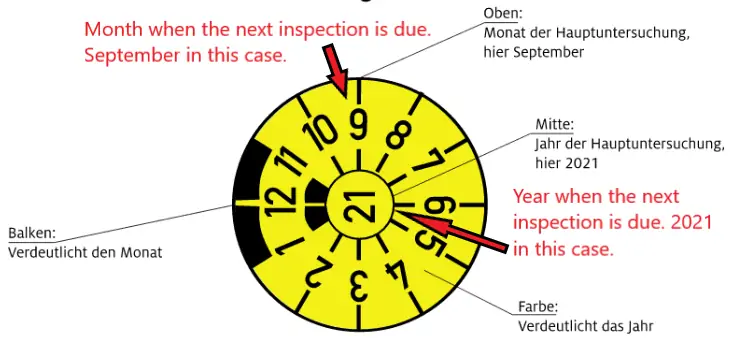This post contains affiliate links. It means that if you click on the links and make a purchase, we will receive a small commission at no additional cost to you. This allows our blog to continue providing you with free information. We only include links and products that we truly believe in. You can read the full disclosure here.
Moving to Germany or new in Germany? Check out our Resources Page for all the help you need!
Are you wondering how to buy a car in Germany? Buying a car in Germany doesn’t have to be complicated. Together with my husband, we have bought and sold 5 different cars in the last few years. These include both new and used second-hand cars in Germany.
In this guide, you will find all the tips on how to buy a car in Germany. These include the detailed steps of buying a car in Germany, the costs of buying and running a car, where to buy a car, and the different types of cars you can choose. I also include some tips on what to look out for when buying a car in Germany.
Table of Contents
ToggleA short summary for the busy people
If you don’t have much time, here are the 7 steps of buying and registering a car in Germany:
Step # | Steps | Description |
1 | • Decide if you want to buy at a dealership or from a private seller. • Know the specification and the type of car you want. | |
2 | See the car in real and test drive it. | |
3 | • Sign the contract. • Think about the different finance options. | |
4 | Make a roadworthiness inspection (if needed) | • A dealer may do this for you. • If you buy from a private seller, you don’t have to make a new inspection if the current TÜV certificate is still valid. • But you should pay attention to the next inspection due date. |
5 | You need an eVB number provided by the car insurance to register your car. | |
6 | • Either by yourself or via your dealership or registration service. • Make sure you bring all the necessary documents. • You can buy a new license plate during the registration. • Once done, you will get new registration certificates, as well as a TÜV sticker and an official seal of registration on your license plate. | |
7 | • Pick up your car. • Get all the necessary documents from the seller. |
For more explanation, keep on reading to learn the details about each of these steps.
Introduction
Many people in Germany own a car. I live in a small town in Germany. With 2 small kids, I cannot live without a car. In fact, everyone I know here has a car (or two).
In 2023, there are 48.76 million cars registered in Germany. This is over one car per 2 people on average. Some popular car brands in Germany include Volkswagen, Audi, BMW, Mercedes, etc.
After living in Germany for some time, you may now have a stable job and salary. It may be time to think about buying a car.
Unfortunately, buying a car the first time can be a stressful experience for many. The process of buying a car is usually only in the German language. There is also a lot of bureaucracy and paperwork involved in the process.
But don’t worry. We will tackle them one by one. Once you are familiar with the process, you will feel less overwhelmed. I know many foreigners who bought their cars in Germany. So, you can do it too.
If you don’t have a driving license yet, or if it is your first time driving in Germany, make sure to check this out first: Driving in Germany – German driving license and driving rules
Read also: Leasing a Car in Germany – How to Find the Best Deal?
Do you really need a car in Germany?
It depends on where you live. If you live in a big city like Munich, you don’t need a car. The traffic is horrible there and it can take forever to find a parking space. So, you will be better off by just taking the public transportation.
However, if you live in a small town, it can be inconvenient without a car. This is especially true if there is no public transportation nearby.
Another plus to having a car is when you need to drive outside the city. For example, for a day trip or a road trip. Of course, you can also take a train. But driving is usually faster and more convenient.
Read also: Living in Germany – Big City vs. Small Town
Can you buy a car in Germany as a foreigner?
Everyone over 18 years old (and has the money) can buy a car in Germany. However, before you can drive the car, you need to first register it. And to register, you need to be a registered resident with a permanent address in Germany.
Besides, make sure you have a valid driving license to drive the car. You may drive with your foreign license for a certain time if it is valid in Germany. Otherwise, you will need to make a German driving license.
Different types of cars to buy in Germany
There are different types of cars you can buy in Germany. In general, you can buy either a new car or a used car in Germany. Which one you should choose depends on your situation. For example, your budget, your desired car model, the level of customization, etc.
Let’s have a look at the different types of cars below.
Buying a new car in Germany (Neuwagen)
The advantage of buying a new car in Germany is that you can discuss with the car dealer all the configurations you want. So, you can customize your car based on your need.
New cars are built with more efficient engines and come with all the latest technology and equipment. You will need to pay the 19% VAT tax when buying a new car in Germany. Since you will be the first owner of the car, you can also sell your car easier in the future.
The drawback is, of course, the high price. New cars lose value very fast at the beginning. It is probably not the most economic option if you want to buy a car in Germany.
Buying a used car in Germany (Gebrauchtwagen)
According to a survey by Statista in 2021, 4.33 million people want to buy a used car in Germany. This is much higher than the 1.78 million people who want to buy a new car.
As you can see, it is more popular to buy a used car in Germany. You can get a great deal if you shop around. Buying a used car in Germany is more economical as new cars depreciate a lot in the first years. You can buy a used car in Germany from a dealer or a private person.
The biggest advantage of buying a used car is the price. But it is also riskier as you may not detect any issues right away.
Buying a one-day registration car (Tageszulassung)
Sometimes, a dealer may register a new car for a single day. The registration is only done on paper. It means that the car is not driven and it is completely new.
Once registered, the new car can be sold as a used car because it already has a previous owner. The buyer can then buy the car at an attractive price, even though the car is actually new.
The dealer does this because he can sell the car to a buyer at a high discount without lowering the regular list price. There is usually very little room for a discount if a car is completely new. By doing a one-day registration, the dealer can generate more sales (and more bonuses).
For the manufacturers, they want more new cars to be registered because this can drive up their monthly registration statistics. This statistic is important for them to be more successful in the industry and attract more buyers.
Buying a one-year-old used car in Germany (Jahreswagen)
A “Jahreswagen” is a one-year-old used car. Employees from the dealerships can buy new cars at a discount. They can then resell the cars after one year. Some Jahreswagen can also be previous rental cars from car rental companies.
You can find Jahreswagen at the brand dealerships. It is a good deal because these cars are almost new. But they are much cheaper as you avoid the high depreciation in the first year.
Buying a demonstration car in Germany (Vorführwagen)
Demonstration cars are those that were displayed in the showroom. They were used for test drives by customers who were looking for a new car. These cars are in very good condition with low mileage.
Even though these cars are almost new, they are significantly cheaper than new cars since they have been used. The only drawback is that you cannot customize the cars by choosing different features. You have to take the car as it is.
Buying a car at a dealership vs. a private seller
The pros and cons
The main advantage of buying from a private seller is the cheaper price. Buying from a dealer is more expensive. But it is more secure and you also receive much more services.
You can see an overview of the pros and cons below.
| Pros | Cons |
Buying a car from the dealership | • More reputable • They usually take care of the initial paperwork. • They usually offer a car registration service. • Lower risk as you will have a 1-year warranty. • You can buy a guarantee for the following years. • You can find almost new cars such as one-year-old used cars or demonstration cars • You can usually get good advice from the dealers. • Test drive is possible. • Financing may be possible at the dealership. • It may include a new TÜV inspection taken care of by the dealership. | • Paying 19% VAT tax on top • More expensive |
Buying a car from a private seller | • No need to pay 19% VAT tax • Much cheaper price | • Riskier as there is no guarantee. • Deal with paperwork such as registration and purchase contract. |
Car dealership warranty (Gewährleistung)
If you buy a new car at a dealership, it will come with a 2-year warranty. If you buy a used car there, you will get a 1-year warranty. The warranty is compulsory by German law.
The warranty will cover the repairing costs in case your car has an existing defect before your purchase. This does not cover damage that happened after your purchase such as normal wear or issues caused by your negligence. This warranty protects you in case the car has any hidden defects that you didn’t notice at the time of purchase.
Car dealership guarantee (Garantie)
The guarantee is optional and you usually have to purchase it as an extra at the dealership. This is not the same as the warranty.
The warranty protects you from existing defects at the time of purchase. The guarantee covers defects that happen after your purchase.
For example, you can buy a three-year guarantee. In case you need repair services in the first 3 years, part of the repairing costs will be covered.
Buying a car from a private seller in Germany
Buying a car from a private seller doesn’t have to be bad. You just need to be more careful. For example, you can do research online beforehand to see what are the common issues with a specific car model.
Besides, you can also use a site like AutoDNA to check the history of a used car. Enter the vehicle identification number (Fahrgestellnummer) on the website. You can then buy a report that shows you details of the used car such as accident history, mileage, number of previous owners, etc. The report will also show you in case the car was stolen or if it has any factory defects.
Here are some other tips provided by ADAC if you want to buy a used car in Germany. ADAC is the biggest German automobile club. You can also find checklists on the ADAC website that tell you what to look out for.
How to buy a car in Germany (step-by-step)
Step 1: Find the car you want to buy
Where can you find a car to buy in Germany?
Buying a car from a dealership
You can find a car by visiting the dealerships directly or looking for your dream car online. Cars offered by dealerships are usually listed online too. So, it is easier if you start your research online.
The most popular websites to search for a car online are autoscout24.de and mobile.de. Their websites are in English and you can find both new and used cars there.
Just set up a profile. You can then search your car based on different criteria such as car model, mileage, etc. You can also set up an alert so that you are notified when new cars that meet your criteria are available.
Buying a car from a private person
In case you want to buy a car in Germany from a private person, eBay Kleinanzeigen is also a good place to look at (besides autoscout24.de and mobile.de). I used eBay Kleinanzeigen all the time to buy and sell second-handed products in Germany. You can also find a lot of used cars listed there.
Pay attention to these criteria when buying a car in Germany
Manual vs automatic
In Germany, most of the cars are manual (stick shift). You need to search for an automatic car in case you didn’t learn how to drive a manual car.
Diesel vs petrol
The type of fuel for a car is important. Nowadays, you can also buy an electric or hybrid car.
Horsepower
This is the power an engine produces.
Air conditioning
Make sure the car has air conditioning if you want one. Not all cars have that.
Mileage
This shows you how much the car was used. Of course, the lower, the better.
The number of previous owners
Again, the lower, the better.
The date of first registration
This shows you the age of the car.
Accident-free car
You should look for a car that did not have an accident before.
Existing issues
Say no to cars that have any existing issues
Date for the next inspection
In Germany, all cars are subject to regular technical inspection. The best is to find a car that has just been inspected, or there is at least one year left until the next inspection due date.
Maintenance record
You should only buy the car if the seller can provide a full maintenance record.
Cost of car insurance
In Germany, the price of car insurance can be affected by the car model. If you decide on a specific car model, check the price of the car insurance first as this will affect your running expenses in the future.
Emission sticker
You can only drive in most German cities if your car complies with a certain emission standard. The emission standard is indicated by putting a sticker on the corner of your windscreen.
A green emission sticker is needed to enter most urban areas. So, make sure you buy a car in Germany that meets the emission standard. You can get the sticker when you register your car, or at the gas stations.
For more info about emission stickers, you can check out this website.

Step 2: Visit the seller
After you know which car you want, you can contact the seller. Then, you can make an appointment to visit either the dealership or the private seller.
Normally, you will be able to test drive the car. Ideally, you should test drive the car on a sunny day with good weather so that you can see in case of any defects. Of course, you need to bring your ID and driving license to test drive the car.
If you want to buy a used car in Germany and you are not familiar with cars, bring someone with you who knows cars. You can also check out this article published by ADAC. It tells you what you should be aware of when buying a used car in Germany.
Step 3: Buy the car
Sign the contract
If you decide to buy the car, you will need to sign the contract and pay a down payment. However, you cannot just drive the car home afterward. In Germany, you need to first insure and register the car before you can drive it. This will be discussed in the next steps.
Payment options
If you buy a car at a dealership in Germany, you can usually pay with a credit or debit card. In case you buy from a private seller, you may pay by cash.
Best way to transfer money internationally
If you have to transfer money from your home country to finance your car purchase, use a P2P transfer service such as Currencyfair or Wise. They use the real exchange rate (from Google) when you convert your home currency into Euros. You can save loads of money by doing so.
Currencyfair is also offering 10 free transfers to our readers now if you want to try it out for free.
For more details and different options to transfer money to Germany, check out this post: Transfer Money Internationally – Best Ways To Send Money To Or From Germany
Can you bargain the price with the dealership?
In general, it is not so flexible in Germany to negotiate the car price at a dealership. If you can pay the full price at once, some dealerships will give you a discount. But if you need to finance your purchase, it is unlikely to get a discount.
If you want to save some money, you can compare prices from different dealerships. For example, you may get a better price if you buy from a small dealer in a suburban area.
You may also choose to exclude certain features in the car to save money, e.g. sound system or other accessories. Another way to save money is to trade in your existing car for a new car.
Getting a loan to finance the car purchase
Many dealerships in Germany offer finance programs internally. So, if you need a loan to buy a car in Germany, you may want to discuss the payment options and the interest rates.
Even though some dealerships can offer interest rates lower than some banks, it may not be the best way to finance your car purchase. It is because you will usually need to pay back the loan earlier compared to getting a loan from a bank. Besides, you cannot get any discount from the dealership if you need its finance program.
For more about getting a loan in Gremany, check this out: Loan in Germany – How to Get a Personal Loan (+ Best Offers)
If you have just moved to Germany, you may not be able to get the loan at all because you don’t have a credit history (SCHUFA) yet. For more info, check this out: What is SCHUFA – How to get SCHUFA in Germany?
In this case, you may want to consider getting a crowdfunding loan such as Auxmoney instead.
Auxmoney
Auxmoney is a leading digital platform for private loans in Europe. Unlike a bank loan, Auxmoney offers a crowdfunding loan. You can get a loan from other private investors instead of a bank.
Some highlights:
- Loans from 1,000 EUR to 50,000 EUR
- Application online without unnecessary paperwork and bureaucracy
- Approval within a few minutes
- Free usage of loans
- Flexible terms between 12 and 84 months
- Get a loan even with a lower SCHUFA credit score
- Your loan can be ready to be paid out within 24 hours
- Submit a non-binding loan request for free without affecting your SCHUFA score
- Possible for self-employed people, freelancers, housewives, students, and employees within their probation period to get a credit
Submit a non-binding loan request for free now!
Alternatively, you can also compare different loan offers using a comparison tool such as Verivox or Tarifcheck.
Step 4: Make a roadworthiness inspection (if needed)
What is TÜV Inspection?
In Germany, your car must pass a roadworthiness inspection every 2 years. In case it is a newly registered car, the first inspection is due after 3 years.
The roadworthiness inspection can be performed by private organizations including TÜV, DEKRA, GTÜ, or KÜS. Since TÜV is the most popular organization for this inspection, many people simply call the roadworthiness inspection the “TÜV inspection”.
The roadworthiness inspection consists of two parts: the main inspection (Hauptuntersuchung/ HU) and the emission test (Abgasuntersuchung/ AU). Both tests are part of the same inspection now. So, people simply say “TÜV inspection” when they refer to them.
Once your car passes the roadworthiness inspection, you will get a sticker on your rear license plate.
How much does the inspection cost?
The price depends on the type of your car. It is more expensive if your car is heavier. For example, for cars up to 3.5 tons, the inspection will cost around 140 EUR.
Who should take the car to inspection?
Sometimes, dealers in Germany may include a new roadworthiness inspection if you buy a car from them. In that case, the dealer will have to take the car to inspection and send you the TÜV certificate afterward. You need this certificate to register your car later.
In case the car already has a valid TÜV certificate, you don’t necessarily need to do a new inspection again. In that case, ask the previous car owner to give you the TÜV certificate.
Getting all the necessary papers from the dealer
If you buy a car from a dealer in Germany and he takes the car to the roadworthiness inspection, you may need to wait a few days until the inspection is done.
Then, the dealer should send you the TÜV certificate, as well as other car registration papers (Zulassungsbescheinigung I & II). Once you receive all these papers, you can take them with you and register your car. You can also pay the rest of the money to the car dealer.
Why is the next TÜV inspection date very important?
To drive your car, you need to first register the car. And you need a valid roadworthiness inspection to register your car. If a car fails the inspection, you cannot register it and cannot drive it.
This is the reason why old cars are much cheaper when the next TÜV inspection date is coming soon, or when the inspection is already overdue. Do not buy such cars! You may need to spend a lot of money to repair the car so that it can pass the inspection.
That is why you should always pay attention to the next TÜV inspection date when buying a used car in Germany. The best is to buy a car that has just been inspected.
Step 5: Look for car insurance
Get an eVB number
You need to have an eVB number to register your car (in German: “elektronische Versicherungsbestätigung”). You can get this number after buying your car insurance. The eVB number proves that your car is covered by insurance.
Different types of car insurance
There are 3 types of car insurance in Germany:
1. Car liability insurance (KFZ-Haftpflichtversicherung)
This is a basic requirement by law. It covers all damage or injuries you cause to other people or objects.
2. Partial car insurance (Teilkasko)
This provides more coverage including theft and fire.
3. Comprehensive car insurance (Vollkasko)
This also covers the damage to your own car and injury to yourself.
Partial and comprehensive car insurances are much more expensive than liability insurance. You should choose the suitable car insurance depending on your situation. For example, if you buy a very old car, only getting liability insurance may be sufficient.
For more details about car insurance, check out this post: Car Insurance in Germany – 13 Ways to Save Money
Get your eVB number for the whole year
In Germany, it is possible to register your car and have car insurance only for certain months of the year. For example, some people only want to drive in the summer.
So, if you plan to drive every day, make sure you get car insurance for the whole year.
Which car insurance provider should you choose?
To find the best car insurance in Germany, we recommend using platforms like Check24, Verivox, Preisvergleich, or Tarifcheck. You can compare different car insurance in Germany with these platforms. Note that these platforms are in German only.
Step 6: Register the car and get the license plate
4 different ways to register your car
Before you can drive the car, you need to first register it. You can only register your car in the city you are registered in. There are 4 ways to do the registration: online, via the dealership, using a registration service, or in person.
1. Register your car online
Registering your car online in Germany is only possible if the car meets certain requirements. For example, the car needs to be first registered after 01.01.2015. Besides, your ID card needs to have an activated eID function. So, many people may not be able to register their cars online.
For the detailed steps about how to register your car online, check out this article.
2. Register the car via the dealership
If you buy your car at the dealership, they may register the car for you. You will usually need to pay a fee for this service. Just provide all the necessary documents to the dealership and they will register the car for you.
3. Register the car by using a registration service (Zulassungsdienst)
If you did not buy the car via the dealership and you don’t want to register the car by yourself, you can also use a registration service such as Korschke. It is very convenient and you can register your car online in 5 minutes. No need to wait at the registration office.
4. Register your car in person
Car registration is done at the vehicle registration office (KFZ-Zulassungsstelle). You can only register your car in the city you are registered. Find your local vehicle registration office online and get an appointment there.
Depending on the registration office, you can sometimes just walk in without an appointment. But to reduce your waiting time, it is better to book an appointment in advance.
In case you are waiting for the car registration papers (and TÜV certificate) from your dealer, you will need to plan some buffer time when you make the appointment. It can take a few days until you receive all the documents per post. And you need to bring these documents when you register your car.
What documents do you need to register your car?
Make sure you bring all the necessary documents with you when you register your car in Germany. In general, you should bring the below document.
- Your ID or passport
- Your proof of residence (Meldebescheinigung)
You will need to bring this if your ID/ passport does not show your address.
- Your proof of residence (Meldebescheinigung)
- Your German residence permit
- A completed registration form
You can print this form online from the website of the registration office.
- A completed registration form
- SEPA direct debit mandate (SEPA-Lastschriftmandat)
You can find this form on the website of the vehicle registration office. Signing this mandate allows the authority to withdraw vehicle tax directly from your bank account.
- SEPA direct debit mandate (SEPA-Lastschriftmandat)
- The eVB number
This is a confirmation that you have car insurance.
- The eVB number
- Your old car license plate (if applicable)
- A valid TÜV certificate
You need this if you are buying a used car.
- A valid TÜV certificate
- Certificate of Conformity
Only if you are buying a brand new car.
- Certificate of Conformity
- Registration certificate (Zulassungsbescheinigung I & II)
- Money for the registration fee
This costs around 20 to 30 Euro. You can usually pay with cash or a debit card.
- Money for the registration fee
- Money to buy a new license plate
This costs about 10 to 40 Euro.
- Money to buy a new license plate
- Money to buy the emission sticker
This costs about 5 to 10 Euro.
- Money to buy the emission sticker
How to get a license plate?
You can choose the number of your new license plate if the combination is available. The first letters on your plate always indicate your registered city. For example, if you register in Munich, your license plate will start with the letter “M”.
There are many shops next to the registration office selling license plates. You can get a new license plate at one of those shops during your registration. Bring your new license plate back to the registration office and the staff there will put a sticker on your plate when you finish the registration.
Alternatively, you can also buy your license plate online before your registration date and bring it to your registration appointment.
Seasonal license plate (Saisonkennzeichen)
It is good to know that in Germany, it is possible to get a seasonal license plate that only allows you to drive in certain months. Some people do that to save money. For example, they only want to drive in the summer. They can then pay a lower car tax and insurance expenses.
You will see numbers on the right-hand side of a seasonal license plate. For example, if you see 04 and 10, it means that the car can only be driven between April to October.
What is the TÜV sticker (Prüfplakette)?
You need to show a valid TÜV certificate to the staff in the registration office. They will then put a TÜV inspection sticker on your license plate. This sticker indicates when your next roadworthiness inspection is due.
How to read the TÜV sticker?
At first, it may be confusing to understand the sticker. But it is actually not too complicated once you know how it works.

In the middle of the sticker, it shows you the year when your next TÜV will be due. In this case, the next TÜV inspection is due in 2021.
The number at the top (in your 12 o’clock direction) indicates the month when the next TÜV inspection is due. In this case, it will be in September. It means that you need to do a TÜV inspection by September 2021.
Alternative ways to read the TÜV sticker
The color of the TÜV sticker indicates the year your next TÜV inspection is due. For example, red for the year 2022, pink for 2023, green for 2024, etc. So, you can tell already from far away which year you need to do your next TÜV inspection.
Notice also that there are 2 thick black bars on the edge of the circle. This is another way to tell the month when your next inspection is due. You can see the black bars already from far away.
In this case, the 2 black bars are located between your 8 o’clock and 10 o’clock directions. It means that September will be the month when your next inspection is due. This aligns with the number “9” you see at the top of the circle.
Similarly, if you see the black bars located between your 1 o’clock and 3 o’clock directions, it means that February will be the month when your next inspection is due. You should then also see the number “2” at the top of the circle.
What happened after you registered your car?
Once you submit all the necessary documents and register your car, you will also get a new sticker on your license plate which shows that your car is now registered. This is the official seal of registration.
You will also receive your new vehicle registration certificates below. They will now have your name and address on it to show that you are the owner of the registered car.
- Fahrzeugschein/ Zulassungsbescheinigung I
This is a small piece of paper that you must keep with you when you drive.
- Fahrzeugschein/ Zulassungsbescheinigung I
- Fahrzeugbrief/ Zulassungsbescheinigung II
This is a larger paper that you should keep in a secure place. You don’t need to have it when you are driving.
- Fahrzeugbrief/ Zulassungsbescheinigung II
These are very important documents for your car and you should keep them carefully. Never buy a used car if the seller cannot provide the registration certificates. Either the car is immobile for some time or it may even be a stolen car.
How long is the registration valid?
Your car registration is valid until you sell the car. If you sell the car, you need to deregister it and cancel your car insurance. The car should then be registered by the new owner.
If you move to another city, you will need to register in your new city again. You can also choose to deregister your car in case you don’t use it and want to save money.
Step 7: Get your car
Congratulations! Now you are ready to drive and you can go to pick up your car from the seller. When you pick up your car, make sure you get the following things from the seller:
- Purchase contract (Kaufvertrag)
If you are buying a second-hand car in Germany from a private seller, make sure you also have a purchase contract. If needed, you can use a purchase contract template from ADAC. If you are buying at a dealership, a guarantee may be included. Make sure this is also stated in your contract.
- Purchase contract (Kaufvertrag)
- Maintenance and service record (Scheckheft)
This shows you everything that has happened to the car in the past, including inspection and repair. It is important to get this document and maintain the record.
- Maintenance and service record (Scheckheft)
- Owner’s manual
Even though it is not compulsory, sellers usually keep the manual. This can help you in case you want to do basic repair and maintenance.
- Owner’s manual
- All the car keys
- Extra parts
Sometimes, the seller has installed replacement parts in the car. In that case, you can ask him to give you the original parts as well.
- Extra parts
How to buy a car online in Germany?
Does the process of buying a car in Germany sound daunting to you? I can totally feel you. Visiting the seller/ dealer, test driving the car, and visiting the registration office can be overwhelming, especially for a foreigner in Germany. It is even worse if your German level is not sufficient.
If that sounds like you, buying a car online may be a better option for you. Yes. It is possible to buy a car online! In fact, it can be much easier because you literally don’t have to go anywhere. You just need to choose a car online. The car will be delivered to you and you can start driving right away.
Buying a car online in Germany
You can use an online platform like Instamotion to buy a used car in Germany. Here are some advantages:
- Order your car online without leaving your home
- They help to register your car (it saves you the trip to the registration office and all the hassles)
- You can drive the car right away once it is delivered to you
- All cars have a maximum of 5 years old
- All cars have a maximum of 100,000 km mileage
- All cars are premium used cars that have been quality checked
- All cars have a TÜV inspection of one-year minimum
- All cars come with 1 year of guarantee from Allianz
- Financing is possible via the Instamotion website
- You can return the car within 14 days if you don’t like it
If you don’t have a car yet (immobile), buying a car online can be much easier as you don’t have to worry about traveling to the dealerships or registration office. You don’t need to worry about speaking German. Although the website of Instamotion is in German, you can easily translate it with Google Chrome.
You have a wide range of used cars to choose from. They all have been quality-checked. You also get a 1-year guarantee. So, it is less risky compared to buying from a private person.
One drawback is that you cannot do a test drive. However, you have a 14-day money-back guarantee.
How much is it to buy a car in Germany?
If you buy a car in Germany, you should expect some extra costs on top of the car price.
| The average cost in EUR | Comment |
Car price | • New car: 44,630 EUR • Used car: 18,620 EUR | Varies based on car model and conditions. |
Transportation cost | 400-1000 EUR | Cost to ship the car to the dealer. Only for new cars. |
Registration costs | 35-80 EUR | Including registration fee, license plate, emission sticker |
Car tax | 220 EUR per year | Check this car tax calculator |
Car insurance | • 250 EUR per year for car liability insurance only. • Or 571 EUR per year for comprehensive car insurance. | Depends on coverage and different factors. |
TÜV inspection | 140 EUR per inspection | • May not be necessary if the car already has a valid TÜV certificate. • Some dealers cover the costs as well. |
As you can see, you can pay about 1,000 EUR on top of the car price if you plan to buy a used car in Germany. If you want to buy a new car, the cost is even higher (another 400 to 1,000 EUR on top). You can see the detail of each of these costs in the below session.
Car price in Germany
The average price of a new car in German is 44,630 EUR in 2023. If you buy a used car in Germany, it will cost 18,620 EUR on average. The price varies depending on the model, year of construction, mileage, configuration, etc.
If you plan to buy a used car, you should know that there is something called “Schwake Liste” in Germany. The Schwacke list includes about 30,000 vehicles of different models. It is a benchmark for both car sellers and buyers to determine the value of a used car.
Besides, you can also use wirkaufendeinauto.de or ADAC as a reference to estimate the value of a used car.
Transportation cost of a new car
If you are buying a new car in Germany, be aware that you may have to pay a transportation cost. This is the cost to ship the car to the dealer. And the cost is not listed in the price.
On average, transportation costs can range from 400 to 1000 EUR. And it can be as high as 10% of the listed price of the new car. So, be sure to plan for this expense as well if you are buying a new car in Germany.
Car registration in Germany
The cost of car registration in Germany depends on your city. On average, you may pay around 35 to 80 EUR in total.
| EUR |
Registration fees | 20-30 |
License plate | 10-40 |
Emission sticker | 5-10 |
Total | 35-80 |
Car tax in Germany
Car tax is “KFZ-Steuer” in German. The logic behind this tax is that the vehicle owners are responsible for the damage they cause to the roads and the environment.
The amount of car tax varies based on the vehicle type, fuel type, engine capacity, etc. In general, the car tax can be around 220 EUR per year. You can use this car tax calculator to see how much you have to pay based on your car.
Read also: Tax Return in Germany – English Guide
Car insurance in Germany
The price of car insurance in Germany depends on a lot of factors. For example, your age, your driving record, the amount of deductible, the type of your car, the insurance coverage, etc.
According to the law, you need to have at least car liability insurance at the minimum. This costs about 250 EUR per year on average. If you want to have comprehensive car insurance, it will be significantly more expensive. On average, you will have to pay an extra 321 EUR. So, the car insurance will cost 571 EUR per year in total.
For different ways to save money on car insurance, check this out: Car Insurance in Germany – 13 Ways to Save Money
How much is it to own a car in Germany?
Before buying a car in Germany, you should estimate the running expense. Keeping and running your car cost money.
| Average cost per year in EUR | Comment | |
| Fuel costs | 1,496 | Assumption: • 12,000 km mileage per year |
| Parking cost | 360-1,800 | • Price of renting a parking place. • Price varies based on where you live. • You may be able to just park on the street for free. |
| TÜV inspection | 70 | • About 140 EUR per inspection. • You need to do it every 2 years for a used car. |
| Changing tires | 80-140 | Changing and storing your tires at the repair shop. |
| Changing oil | 100-220 | For the filters, oil, and also the labor costs. |
| Automobile club membership | 54-139 | Yearly subscription. |
| Car tax | 220 EUR | Check this car tax calculator |
| Car insurance | • 250 EUR per year for car liability insurance only. • Or 571 EUR for comprehensive car insurance. | Depends on coverage and different factors. |
Besides all of the above costs, you may also need to replace wear parts in the car over time such as tires or exhausts. This can all cost money depending on how much you drive the car and how well you maintain it.
All in all, you may spend about 2,400 to 5,000 EUR a year running your car. Or around 200 EUR to 400 EUR per month. It depends largely on how much you drive. The cost is also much lower if you don’t need to rent a parking place, or if the rent is cheap.
You can see the detail of each of the above costs below.
Fuel costs
The fuel costs depend on your fuel type. On average, it costs 1.781 EUR per liter for petrol. And 1.734 EUR per liter for diesel. You may want to think of ways to save fuel after buying your car.
Read also: Cost of Living in Germany – How to Save Money?
Parking cost
Depending on where you live, you may not need to rent a parking place. For example, you may just park on the street.
In case you need to rent a parking place, the cost depends on where you live. If you want to rent an underground parking garage in a big city, you may need to pay between 100 to 150 EUR per month.
On the other hand, if you rent a parking place outdoor and in a smaller town, you may just have to pay about 30 EUR per month.
TÜV inspection in Germany
If you buy a second-hand car in Germany, you may need to make a TÜV inspection before you can register your car. This will cost around 140 EUR.
TÜV inspection is also a running expense after buying your car. If you buy a new car in Germany, you will need to do the TÜV inspection after 3 years. If you buy a second-hand car in Germany, it will be every 2 years.
Changing tires in summer and winter
In Germany, you should change your tires to winter tires during the winter. The winter tires have more friction compared to the summer tires. During the winter time with snow and ice, it is safer to drive with the winter tires. Besides, if you don’t change to winter tires and have an accident, you may get into trouble with your car insurance.
During the summer, you will have to change your tires back to summer tires. Otherwise, your fuel consumption can be higher. It is because the rolling resistance of a winter tire is significantly higher than that of a summer tire on a warm road.
You can change your tires at car repair shops in Germany. It may be more convenient if you store your winter/ summer tires there as well. In the below table, you can see the estimated costs:
| EUR |
Changing 4 tires | 20-40 |
Storing your tires | 20-30 |
Total | 40-70 |
In General, you can expect to pay about 40-70 EUR every time you go to change your tires. Since you need to change your tire 2 times a year, the cost will be about 80-140 EUR per year.
Additionally, you may need to pay for balancing your wheels. This is mandatory in case your tires wear out unevenly or if your steering wheel vibrates when you drive. This may cost another 3 to 10 EUR per wheel.
Changing the oil in Germany
You should change the oil in your car once a year. You can do so at car repair shops in Germany. When you change oil, you will need to pay for the filters, the oil, and also labor costs. You can expect to pay about 100 to 220 EUR per year for an oil change.
An automobile club membership in Germany
It is highly recommended to become a member of an automobile club in Germany. The most popular automobile club is ADAC in Germany. As a member, you can get help in case of a car accident.
If you are below 23 years old, it is free to be a member. Otherwise, it costs between 54 to 139 per year, depending on the coverage.
Buying a car in Germany – Some useful German vocabulary
I have summarized some German words and abbreviations that would be helpful to know when you are buying a car in Germany.
Different types of cars
German | English |
Neuwagen | New car |
Gebrauchtwagen | Used car |
Jahreswagen | One-year-old used car |
Vorführwagen | Demonstration car |
Combi | Station wagon |
Cabrio | Convertible |
Specification of the car
German | English |
Kraftstoffe | Fuels |
Kilometerstand(KM) | Mileage |
Leistung | Engine power |
PS | Horsepower |
Getriebe (Schalt/ Automatik) | Gearing mechanism (manual/ automatic) |
Klimaanlage | Air conditioning |
Navi | Navigation system |
Tempomat | Cruise control |
Schiebedach | Sunroof |
Sitzheizung | Heated seats |
Zentralverriegelung | Central locking |
Lenkrad | Steering wheel |
Reifen | Tires |
Türen | Doors |
Buying a car in Germany
German | English |
Autohändler | Dealership |
Kaufvertrag | Purchase contract |
Gewährleistung | Warranty |
Garantie | Guarantee |
Scheckheft | Maintenance and service record |
TÜV/HU/AU | Roadworthiness inspection |
Autounfall | Car accident |
Unfallfrei | Accident-free |
Vorbesitzer | Previous owner |
Erstzulassung (EZ) | First registration date |
Führerschein | Driver’s license |
Car insurance
German | English |
Autoversicherung | Car insurance |
elektronische Versicherungsbestätigung (eVB) | Car insurance number |
KFZ-Haftpflichtversicherung | Car liability insurance |
Teilkasko | Partial car insurance |
Vollkasko | Comprehensive car insurance |
Registering your car
German | English |
Autoanmeldung | Car registration |
KFZ-Zulassungsstelle | Vehicle registration office |
Zulassungsbescheinigung | Car registration papers |
Zulassungsdienst | Car registration service |
Saisonkennzeichen | Seasonal license plate |
Prüfplakette | TÜV sticker that indicates the next inspection due date |
Umweltplakete | Emission sticker |
KFZ-Steuer | Car tax |
Conclusion
Now you know the ins and outs of buying a car in Germany. Having a car in Germany can be very convenient, especially if you live in a small town or if you have to do a lot of shopping. Have fun with your new car and drive safe 🙂
Pin it for later:

Where did you buy your car in Germany? Did you buy a new or second-hand car in Germany? Which car model do you prefer? Leave a comment below and share your experience!
Moving to Germany or new in Germany? Check out our Resources Page for all the help you need!
If you found this article helpful, consider supporting this website by buying me a coffee. Every small donation helps to keep this blog alive. You can also ask me any questions here. Buy me a coffee







